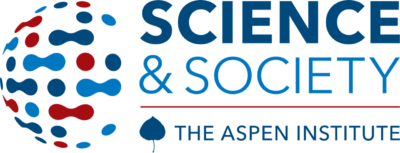InspireScience
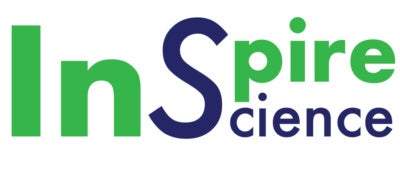
Shoutout from Research!America’s Mary Woolley:
Speaking of the need to encourage young scientists, kudos to NYU Langone Health and the new Aspen Institute Science & Society Program for InspireScience, a lively symposium in New York City focused on how to build a rewarding career both inside and outside the lab. Some 150 early-career scientists from institutions across the city learned about community outreach and advocacy opportunities while hearing personal reflections from prominent scientists.
A symposium inspiring scientists to create a more outward-looking culture through communication, engagement, and innovation.
Friday, September 20, 2019
1:00pm–6:30pm
NYU Langone Health
435 E 30th St, New York, NY
Science Building, Room 103
Scientists of all levels—especially research staff, post-baccalaureate students, graduate students, postdocs, and principal investigators—across New York City are welcome to this special event focused on scientific community building through communication and outreach.
The symposium features five distinguished speakers, Drs. Yasmine Belkaid (NIH), Jessica Polka (ASAPbio), Enrique Rojas (NYU), Kelly Ruggles (NYU Langone), and Victor Torres (NYU Langone), who will share their unique scientific journeys and experiences engaging communities in and outside the laboratory.
The event also features presentations from representatives of several science outreach, communication, and policy groups and an opportunity for attendees to learn how they can get involved.
- BioBus
- Genspace
- National Science Policy Network
- New York Academy of Sciences
- Question of Science (Questão de Ciência) Institute
- Research!America
- Science Sketches
- World Science Festival
The symposium is preceded by a special luncheon with NYU are Women in Science (NYUrWIS) at 12:00pm with Dr. Yasmine Belkaid. For more information about the luncheon, please email Madeleine LaRue.
The program concludes with a reception with live music by the Southern Blots, a band comprised of scientists Drs. Jef Boeke (NYU Langone), Douglas Daly (New York Botanic Garden), and Sidney Strickland (Rockefeller U).
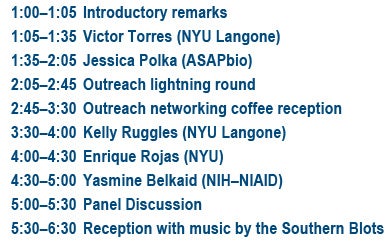
Distinguished speakers:
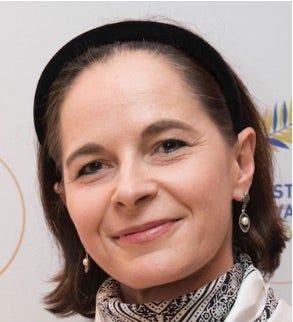 Yasmine Belkaid, Ph.D.
Yasmine Belkaid, Ph.D.
Senior Investigator, NIH–NIAID
“Lasting interactions: microbes, mentoring, and more”
Dr. Yasmine Belkaid obtained her Ph.D. in 1996 from the Pasteur Institute in France. Following a postdoctoral fellowship at NIAID on immune regulation during infection, she joined the Children’s Hospital Research Foundation in Cincinnati. In 2005, she joined the Laboratory of Parasitic Diseases at NIAID and was appointed senior scientist in 2008. Dr Belkaid also holds an appointment at the University of Pennsylvania. Her laboratory has defined fundamental mechanisms that regulate tissue homeostasis and host immune responses and uncovered key roles for the microbiota and dietary factors in the maintenance of tissue immunity and protection to pathogens. She is currently the Director of the NIAID Microbiome program and the director of the NIH Center for Human Immunology and is a member of the National Academy of Medicine and of the National Academy of Sciences.
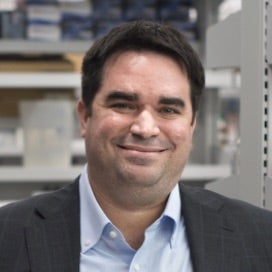 Victor Torres, Ph.D.
Victor Torres, Ph.D.
Associate Professor, NYU Microbiology
“From la Isla del Encanto to the Big Apple: The Story of a Puerto Rican Living a Scientific Dream”
Victor Torres’s scientific career has been devoted to the study of bacterial pathogenesis. He joined the faculty in the Department of Microbiology at NYU School of Medicine in 2008 after completing a postdoctoral fellowship in Staphylococcus aureus biology and pathogenesis in the laboratory of Dr. Eric Skaar. As an independent investigator, he is interested in uncovering the molecular intricacies underlying how methicillin-sensitive and methicillin resistant-S. aureus strains (MSSA and MRSA) differentially regulate the expression and production of virulence factors, the contribution of these virulence factors to S. aureus pathogenesis, and the identification of host factors involved in S. aureus pathobiology. Most of the important discoveries of his lab have dealt with the identification of the receptors for the S. aureus bi-component leukocidins. The long-term objective of his research program is to apply the knowledge generated from their studies toward the rational design of new drugs that specifically target virulence factors as a mean to combat this important bacterium. In fact, many of the discoveries from his lab are licensed by Janssen Biotech Inc., a Johnson & Johnson company, for the development of novel anti-S. aureus therapeutics.
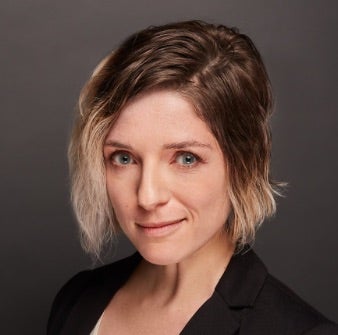 Jessica Polka, Ph.D.
Jessica Polka, Ph.D.
Executive Director, ASAPbio
“Reimagining publishing: making scientific communication more constructive”
Jessica Polka serves as Executive Director of ASAPbio, a researcher-driven nonprofit organization working to promote innovation and transparency in life sciences publishing in areas such as preprinting and open peer review. Prior to this, she performed postdoctoral research in the department of Systems Biology at Harvard Medical School following a PhD in Biochemistry & Cell Biology from UCSF. Jessicais also a Plan S Ambassador, a research affiliate at MIT Libraries, a steering committee member of Rescuing Biomedical Research, and a member of ASCB’s public policy committee. Formerly, she was president of the board of the nonprofit Future of Research and a member of the NASEM Next Generation Researchers Initiative.
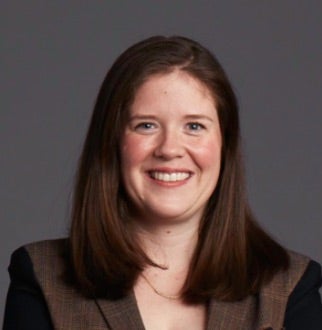 Kelly Ruggles, Ph.D.
Kelly Ruggles, Ph.D.
Assistant Professor, NYU School of Medicine
“Podcasts and programming: my journey from wet lab to computational biology and the paranormal”
Dr. Kelly Ruggles is an Assistant Professor of Medicine at NYU School of Medicine where she focuses on understanding mechanisms of disease through the application of integrative and machine learning methods to multi-omics data. She received her Ph.D. in Metabolic Biology from Columbia University and a BS in Biological Engineering from Cornell University but it wasn’t until her postdoctoral position that she gave up on wet-lab for pure computation. In addition to her research, Kelly has several education leadership roles, serving as the Director, Academic Programs for the Sackler Institute of Graduate Biomedical Sciences, the Graduate Advisor for the Systems and Computational Biomedicine Ph.D. program and Program Academic Advisor for the Biomedical Informatics M.S. program. Her most recent endeavor is as the co-host of the podcast Zero Percent Scared where she engages in weekly debates about the scientific validity of paranormal phenomena.
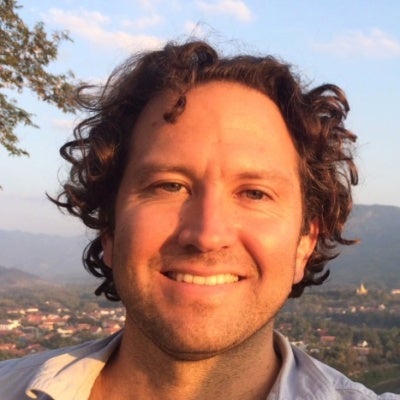 Enrique Rojas, Ph.D.
Enrique Rojas, Ph.D.
Assistant Professor, NYU Biology
“Scientific Bodhisattvas”
Enrique Rojas is an Assistant Professor of Biology at New York University studying physical biology of microbes. His degrees are in physics, but he studied plant and fungal cell mechanics during his Ph.D. Between his Ph.D. and postdoc, he spent 6 months teaching college-level physics and chemistry at a medical school in Nepal. He did his postdoc in microbiology labs, studying how bacterial cells control proliferation. During his postdoc, he spent one year doing field work related to microbial ecology in Bangladesh. Recently, he participated in a cultural exchange program which brought him to a monastery in the middle of nowhere in southern India to teach biology to Tibetan Buddhist Monks and to learn about Buddhism and its connection to Western science.
Outreach, communication, and policy groups:
BioBus
The BioBus mission is to help minority, female, and low-income K–12 and college students in New York City discover, explore, and pursue science. Through this work, we envision a world where all people have the opportunity to reach their full scientific potential. Since 2008, over 250,000 students at more than 500 schools have discovered the thrill of scientific discovery, with many embarking on a path of scientific exploration and sustained pursuit.
Genspace
The best way to inform 21st-century dialogue about science is to have stakeholders understand it from a hands-on perspective. To this end, Genspace is a nonprofit organization dedicated to promoting science literacy through citizen access to biotechnology. We provide STEM educational outreach, cultural events, and a platform for science innovation at the grassroots level.
National Science Policy Network
The National Science Policy Network (NSPN) is a non-profit representing early career science policy, advocacy, and diplomacy groups distributed across the country, focused on providing a platform for sharing resources, building relationships, and training the next generation of scientists and engineers to be pivotal voices in all levels of policy making.
New York Academy of Sciences
For 200 years—since 1817—the Academy has brought together extraordinary people working at the frontiers of discovery. Among the oldest scientific organizations in the United States, it has become not only an enduring cultural institution in New York, but also one of the most significant organizations in the global scientific community.
Question of Science (Questão de Ciência) Institute
Questions of science are often ignored in the public arena and are often framed as questions of politics, economics, or behavior. When this inversion of priorities occurs, the questions of science—which should be solved by logic and evidence—become a matter of opinion. The Question of Science Institute, based in Brazil, aims to rescue rational and critical thinking and bring science back to national and global dialogues.
Research!America
The Research!America alliance advocates for science, discovery, and innovation to achieve better health for all. We urge Congress and the administration to increase funding for federal agencies at levels that keep pace with scientific opportunity. We also advocate for federal funding for global health research and a legislative and regulatory climate that stimulates growth in private sector research and development.
Science Sketches
Science Sketches empowers scientists to communicate with the world using big markers and small words. We seek to create a space where anyone could go to learn about exciting new science, straight from the source and to become a go-to library of videos to bring current science research and basic concepts to the public, funders, policymakers, journalists, and more.
World Science Festival
The World Science Festival gathers great minds in science and the arts to produce live and digital content that allows a broad general audience to engage with scientific discoveries. Through discussions, debates, theatrical works, interactive explorations, musical performances, intimate salons, and major outdoor experiences, the Festival takes science out of the laboratory and into the streets, parks, museums, galleries, and premier performing arts venues of New York City and beyond.
Entertainment:
The Southern Blots are a bluegrass/Celtic fusion trio known for their innovative vocal arrangements and three-part harmonies. Jef Boeke (NYU Langone) plays the dobro, Douglas Daly (New York Botanic Garden) plays the mandolin and penny whistle, and Sidney Strickland (Rockefeller U) plays rhythm guitar.
Organized by Aspen Institute Science & Society Program and NYU Langone Health Institute for Systems Genetics.
Contacts:
Aaron Mertz
Debbie Bemis
